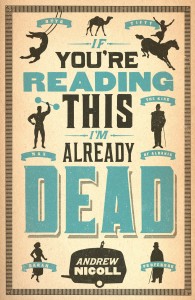 Published by Quercus 26 April 2012
Published by Quercus 26 April 2012
400pp, paperback, £12.99
Reviewed by Paul Sidey
A question: What do Adolf Hitler, King Zog and this reviewer have in common?
Answer: We have all kissed Queen Geraldine of the Albanians.
I am the only survivor.
My embrace took place at the Ritz Hotel in London, after a champagne reception to celebrate Queen Geraldine’s authorized biography, which I published at Hutchinson in 1987. Once upon a time, Geraldine had been a shorthand typist, who fell for a King – King Zog of Albania. She was born a Hungarian countess, with an American mother, and was distantly related to Richard Nixon.
No critic should enter into competition with an author when it comes to tall tales, but Andrew Nicoll’s narrator hero Otto Witte, a man who earned his living as a circus acrobat until Hitler’s Third Reich brought on the Gotterdammerung, makes it hard to resist. Now, sheltering in a tin caravan, while Allied bombs rain down on Hamburg during the final stages of World War II, Witte decides to tell the story of his life – a shaggy dog story to end all shaggy dog stories.
Quite early in the narrative, Otto Witte gives an appreciative nod to Anthony Hope’s swashbuckling adventure, The Prisoner of Zenda. In that classic 1894 yarn, an Englishman passes himself off as his remote cousin, the King of Ruritania. He falls for the Queen, foils a dastardly plot, and sacrifices all for love.
Spotting a picture in a newspaper, Witte discovers he bears an uncanny resemblance to Halim Eddine, the son of the Turkish sultan. (By curious coincidence, King Zog saw Geraldine Appanyi de Nagy-Appony’s photograph in the newspaper too, and asked her to marry him.) It appears that Eddine has been offered the throne of the free and independent state of Albania.
With a motley crew of characters, including the blind Professor Albert von Mesmer, a Hungarian countess with a line in exotic dance, plus a camel, Witte sets off to be first to claim the crown, an Imperial treasure and a harem too.
However, the garrulous narrator of Nicoll’s novel does not share the gentlemanly nobility of Hope’s Rudolf Rassendyll. Witte is an opportunist. He is there for the ride. For the craic. With the utmost relish, Witte tells of duels, femmes fatales, gypsy brigands and of his most luxuriantly impressive moustache, the moustache that most dramatically makes him look like the heir apparent.
At the end of this picaresque entertainment, the author supplies a brief note on how some of the real historical characters slot in. Prime Minister Ahmet Muhtar Zogolli is crowned King Zog of Albania in 1928. Mata Hari, under another name, puts in an appearance. The truth, as it happens, may be stranger than the fiction related here…
Andrew Nicoll’s debut The Mayor won the Saltire First Book Prize. According to his biographical note, Nicolls enjoyed a brief stint as a lumberjack. But, we must assume, he discovered there was more to life. His second novel featured a leading character suffering from writer’s block. The narrator of this new story has no such problems. Nicolls himself has made a successful career as a journalist, and writes with fluency and flair. And in the footsteps of George Macdonald Fraser, who succeeded with Royal Flash in reinventing Hope’s Zenda formula, Nicoll offers his readers a jeu d’esprit of character and plot, which celebrates the art of storytelling, almost for its own sake.
King Zog of history ruledAlbania for eleven years, but fled the country when Mussolini invaded in 1939. After a period of exile, Geraldine died back home in Tirana in 2002. I never accepted her invitation to visit. Which is a real shame. I was the dead spit of her son Leka. Geraldine and an underground monarchist group had a cunning plan to restore the family to the throne, and a secret code in her possession would give her access to the billions in gold bullion abandoned by the Fuehrer, when he and Eva Braun fled by submarine to Argentina. I could have abandoned a career in publishing. Now that would be a story…
